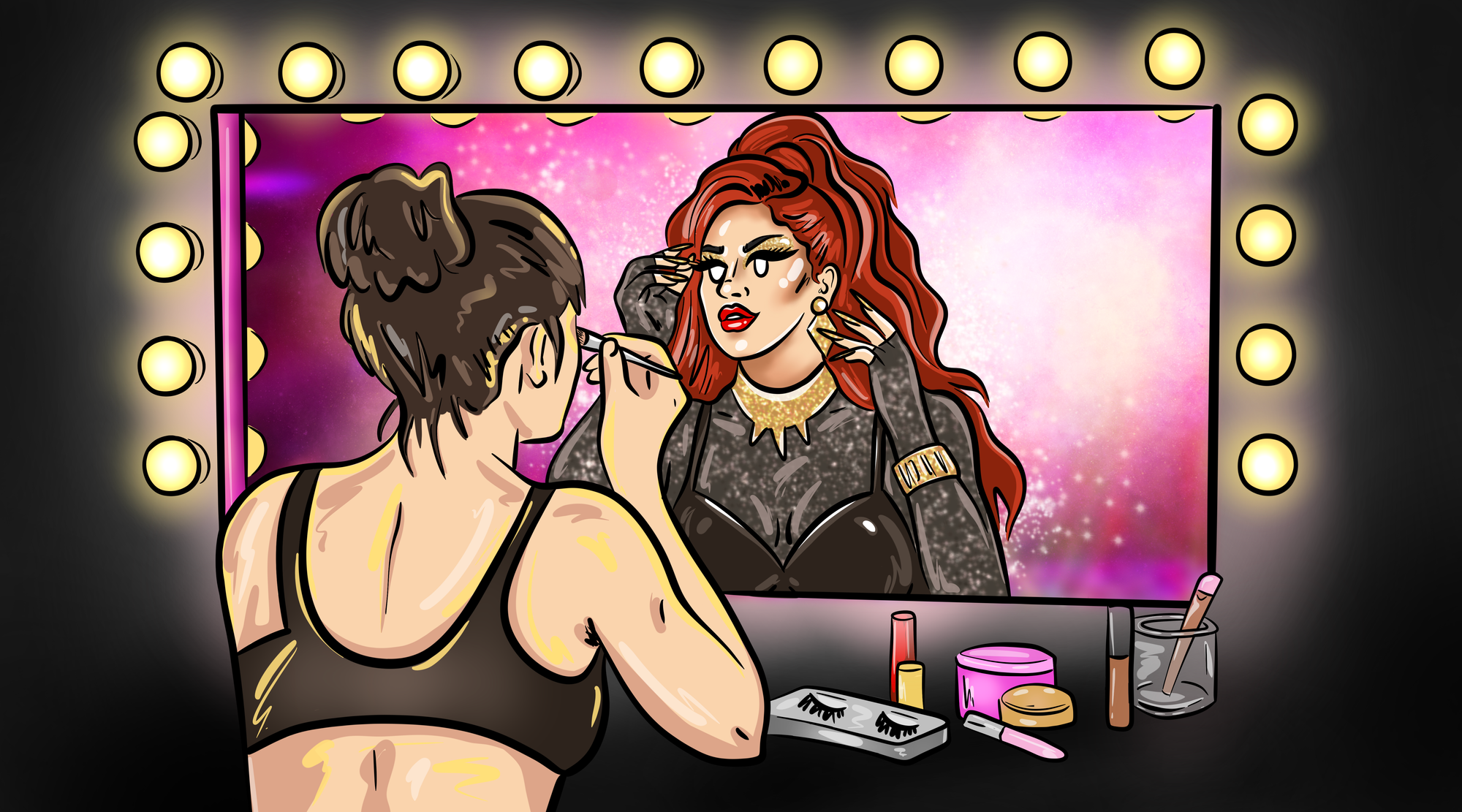The more you learn about the sex industry, the harder it is to ignore other people who get it wrong. But what do you do when those folks are your friends and acquaintances?
As someone who hangs out in a lot of interesting places, I’ve struggled with this. Whether it’s after-work drinks, catching up with old friends from school, or meeting a buddy’s new significant other, I never quite know what kinds of conversations we’ll end up having. Even in spaces that are often assumed to be sex-positive – such as sex education seminars or at swingers’ clubs – I sometimes hear questionable comments about my job. And, as an advocate, I’m happy to set them straight.
But what about you? Perhaps you’re not a sex worker, but you can tell when someone is being whorephobic. If you catch one of your friends listing the virtues of the Nordic model or insisting that street-based workers are bad, how can you intervene without making things awkward?
I think it’s possible. And necessary.
Why shut down sex work stigma?
Whorephobia – or sex work stigma – is the assumption that sex work is immoral, gross, or inherently dangerous. It’s a common take, especially if your social group is a little sheltered. But whorephobic comments do a lot of damage:
- Bad attitudes lead to bad laws. When many people in any given society talk trash about sex workers, it leads to general social standards that normalise this kind of thinking. In the longer term, this often gives rise to laws and regulations that persecute people in the sex industry and make our working conditions less safe.
- It gives others implied permission to harm sex workers. When we’re seen as less than, the people who wish to harm others feel empowered to do so. This means that cops, predators, workplace bullies, and any other kind of person that’s looking for an easy target are more likely to target us.
- Your sex worker friends will be hurt. If there are sex workers in your social group, they’re going to feel bad about this stuff. Being told we’re terrible people over and over is crushing to our self esteem and mental health. And if you think it doesn’t matter because you don’t have any worker friends, think again. Many of us aren’t ‘out’ to our regular peers. What if one of your besties is listening, and feeling terrible, but can’t speak up to defend themselves? That really sucks.
Although I’m ‘out’, many of my friends aren’t. Their judgemental families, social circle or day jobs mean they can’t speak up and defend themselves when the people around them talk shit about sex workers. But you can. By intervening you can change minds, steer people in a better direction, and prevent a lot of harm.
You might be afraid of creating even more discord or perhaps losing a friend. But! I have a few tricks up my sleeve I’ve found helpful. I’m going to share them with you. But first, let’s talk about what doesn’t work.
Interventions I don’t recommend
Through hard life experience, I’ve found that there are some ways of handling the situation tend to return poor results:
- Publicly shaming the other person. Calling a friend out in front of their mates can be a dangerous move. Although it might work if someone is genuinely open to constructive criticism, human nature means that many people simply double down and refuse to admit they’re wrong.
- Pulling rank. Unless you’re actually a sex worker, it’s often not helpful to position yourself as an authority on the topic. As with the previous move, doing so can provoke defensiveness in your friend. And, after all, you’re not an authority, you’re simply someone who has an alternative viewpoint to offer, hopefully backed with a little more factual evidence.
- Becoming angry. You may feel tempted to get shouty, especially if you feel strongly about sex worker rights. If you’re also marginalised, or if you have empathised via your own struggles, an attack on sex workers could feel like a personal attack too. But, if you can, I’d advise you to keep your cool. It’s hard to be strategic when you’re angry, and it’s much less likely that you’ll manage to have a constructive conversation.
Please note that you don’t have to call out whorephobia behaviour every time it happens. If you’re in a vulnerable headspace, or an unsafe social situation, please make the best and safest choice for you on whether to speak up.
The general approach: low-key as fuck
Instead of having a confrontation, try to help your friends do better. It’s not about a satisfying beat-down. Dunking on someone can feel good, but accomplishes very little outside that ego boost. You’re aiming for mutual understanding, even if the exchange feels a little uncomfortable.
Here are some ways to keep it low-key and on-topic:
- Know the right words and use them. If possible, shift your mates away from ‘hooker’ and ‘call girl’ to terms like ‘sex worker’ and ‘erotic labor’.
- Do your research first. This may seem obvious, but you’re going to struggle to have a constructive conversation with someone whorephobic if you haven’t taken the time to learn about sex work.
- Stay curious (and humble). As I said above, you don’t need to sound like an authority. In fact, you’ll often appear more confident if you’re open-minded: “I’m not sure if that’s right, here’s what I’ve heard, and here are some sources you can check out.”
- Let go of wanting to be perfect. It’s hard to get everything out exactly right when you’re having an argument! Just do your best.
Next, let’s look at some specific strategies that might be helpful.
“I can see that you care a lot about this.”
Many civvies mean well but don’t have the facts. And these comments need to be addressed. But acknowledging their good intentions first can be helpful. After all, you have that in common! Once you’ve established your shared values, it’s easier to provide the right information.
Example: “I don’t have a problem with sex workers, but we need to end demand. Otherwise, we can’t control sex trafficking.”
Response: “It seems like you care a lot about this. If you do care about helping people, there’s something you need to know. Decriminalisation is actually the best way to keep everyone safe – it makes life better for sex workers and also makes it easier to spot trafficking victims.”
‘That’s a weird thing to say.’
What’s the best way to deal with offhand, stupid comments that denigrate women and/or sex workers? In this case, It’s best to get in quick with a comment that makes it clear they’ve ruined the mood.
Example: You’re out and about with a group and someone says, ‘That chick totally looks like a hooker!’
Response: “Dude, that’s such a weird thing to say, why would you say that?’
“Want to talk about that some time?”
What if it’s a complex issue, and it’s not the time or place for debate?
Example: In a noisy, crowded bar, someone says, “Sex work is inherently exploitative.”
If you’re able to take that person aside, or schedule time for a coffee chat, you can deliver more complex information, such as – in this case – explaining the contradictions inherent in performing any type of labour under capitalism. Private conversations make it easier to change someone’s mind. We don’t like to back down when others are watching! Talking later also gives you more time to research – perhaps bring them some sources for further reading?
Response: “I think there’s a lot more to it than that. Want to talk about this some time over coffee? Sex workers have taught me some things that might change your mind.”
“Here’s a better story…”
Sometimes you hear something you just know it’s flat-out wrong. It can feel tempting to say so! But sharing a worker’s lived experience is often the best way to change their mind.
Example: Imagine a friend says, “The porn industry is super gross.”
It’s a pretty negative value judgment, and it’s clear that they don’t have any real information to back up their feelings. In these kinds of situations, sex workers are the best people to educate others. We can share our lived experience, and these stories often change minds where facts and figures don’t. Sharing a great book, article, or social media account where sex workers actually talk about their lives can make a huge difference.
Response: “That’s an interesting take. Honestly, I just read this amazing book about one worker’s experience with porn, and I think you’d get a lot out of it. Here’s the title, you should definitely check it out!”
“Actually, I know a sex worker who says that…”
If you’re lucky enough to have a sex worker in your life - or even if you follow some great people on socials – you have another tool in your arsenal. Although you’re not an expert, you can quote people who are.
Example: ‘Prostitution is just about selling your body.’
It can be hard to argue back, especially if they’re acting as though they already have all the information. By referencing someone with more authority, you can clap back in a way that’s hard to argue with.
Response: “Actually, I have a friend who is an escort and they’re a really amazing educator. They teach clients about kinky sex – how cool is that? I’m kind of jealous!”
If you use this approach, remember that it’s not okay to ‘out’ your sex worker friends without their permission. Respect their privacy by not naming names, or sharing identifying details. If you’re not sure, ask your worker friend what they’re comfortable with ahead of time.
“That’s not cool.”
Sometimes the collaborative approach fails, and we need to draw a line in the sand. Although it’s a last resort for me, I’m happy to make it clear that something is unacceptable.
Example: Imagine you’re invited to a party and the host says, “I’m not inviting so-and-so, they’re a hooker. I don’t want to hang out with someone like that.”
In this case, although you might not be able to change someone’s mind, you still have the power to set your own boundary.
Response: “That’s really not okay. If you’re going to exclude someone because of a silly reason like that, I’m out too.”
When the person causing the problem sees that there are consequences for their actions, it sometimes changes their behaviour. At the very least, hanging out with douchebags really sucks… and being selective about who you spend time with can only improve your life, right?
You can be a force for good!
I love being able to have these kinds of conversations. But not all sex workers are in a position to do this. So we need your help.
Even if it’s not perfect, your efforts to counter sex work stigma can have a really positive effect on the people around you. Remember, the goal is always about changing minds. It’s not about political point scoring, being right, or proving you’re morally superior. If you connect compassionately and fill people in on the facts they might be missing, you could very well deepen that friendship. Or, if you do need to put your foot down, you’ll know you’ve done your best.
Hopefully, using some of these strategies, you can shut down whorephobia as soon as it happens, lift the general standard of conversation in your social group, and deepen your relationships with the people around you.
Are you a sex worker with a story, opinion, news, or tips to share? We'd love to hear from you!
We started the tryst.link sex worker blog to help amplify those who aren't handed the mic and bring attention to the issues ya'll care about the most. Got a tale to tell? 👇☂️✨





